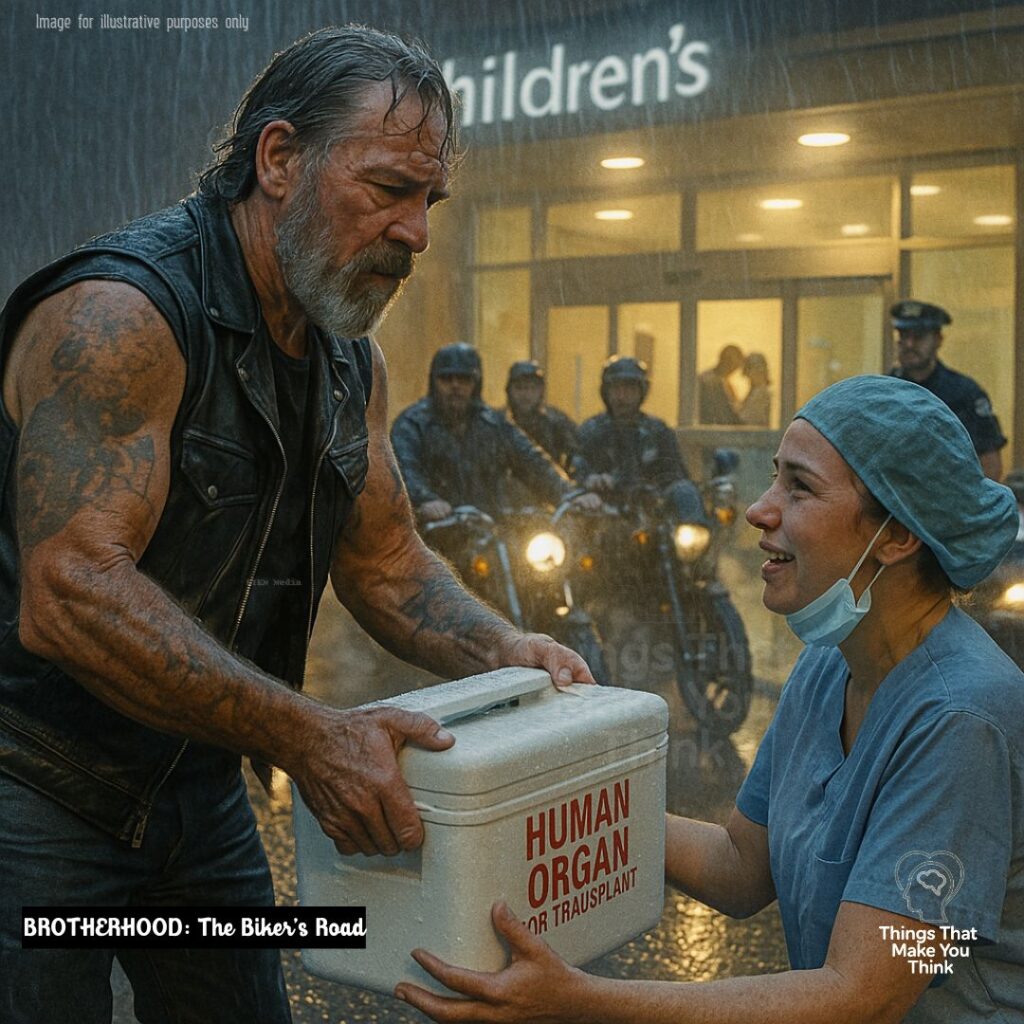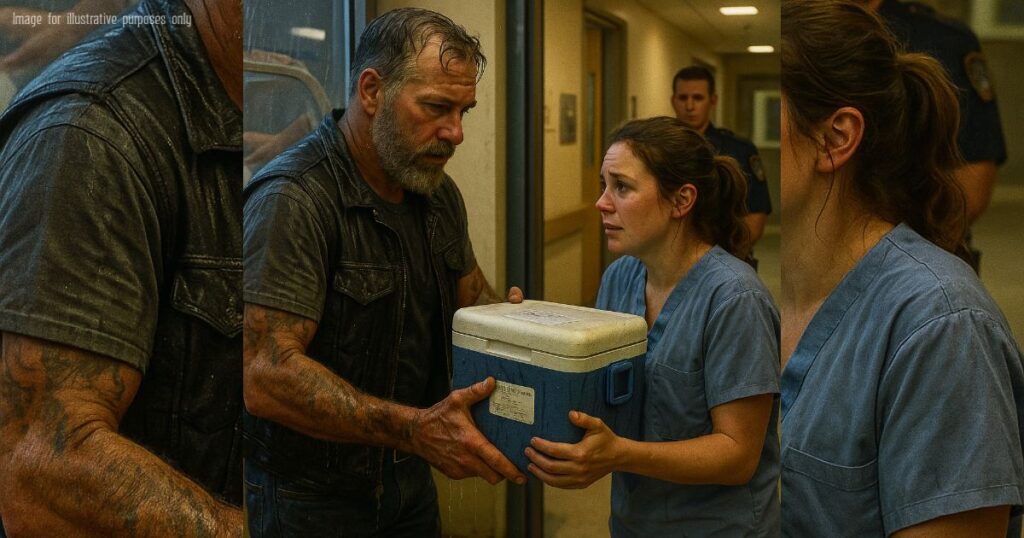
Some rides carry the living.
Some carry the lost.
That night, we carried both.
It was just after dusk when Officer Reeves called. The freeway was a parking lot—jackknifed semi, six lanes frozen, sirens stacked to the horizon. He didn’t waste words.
“Children’s hospital needs an escort,” he said. “Donor heart just landed at the municipal airstrip. Ambulance is stuck behind the pileup. They’ve got two hours of safe time. Can you move a miracle?”
I looked at the brothers gathered in the garage—grease on our hands, day-old coffee in the pot, the bikes half-dressed for bed. Nobody blinked.
“Text me the route,” I said. “We’ll make a river through the rock.”
On the way, Reeves filled in the rest. The donor was nineteen. Caleb. Hit by a drunk driver two towns over. His parents had signed the papers with shaking hands and one request passed along by a nurse who knew us: If there’s any way, let the heart ride with thunder. He grew up listening to it.
We formed up at the airstrip fence as the courier team rushed the cooler across the tarmac—white box, orange letters: HUMAN ORGAN FOR TRANSPLANT. No speeches, no ceremony. The courier placed it into the back of the lead unit, doors slammed, and that van became the most important thing on the road.
Reeves peeled forward with two cruisers. Our chapter split into a wedge—four bikes ahead, four behind, six on the flanks like steel shepherds. I took point on the left, close enough to see the driver’s hands shaking at ten-and-two.
“Steady,” I said into the comm. “We don’t go fast. We go sure.”
The city tried to fight us—rain slick on paint stripes, gawkers, horns, the chaos that finds any emergency and asks for attention. We gave the road something bigger to listen to. Pipes rose together, not reckless, not showy—just a steady thunder that rolled through the gridlock and made people do the thing they forget they can do: make room.
At the first interchange, a school bus driver blocked three lanes with his bulk, waving cars aside so our little caravan could snake through. At the second, a pair of truckers parked nose-out to plug on-ramps. People stepped from their cars and held up phones, but a funny thing happened—more of them put the phones down and lifted their hands in a kind of clumsy salute. Maybe they didn’t know who the heart was for. Maybe they did. But they knew it mattered.
Halfway there, rain hard as nails. The courier van threw a rooster tail; my visor blurred into smear. We tightened, bodies becoming the shape of windbreaks. My left boot scraped concrete once, twice. The cooler in that van felt like a clock I could hear under the engine.
“Two minutes to the hill,” Reeves said. “Ambulance unit waiting at the hospital ramp. Last stretch is yours.”
The hill is where the city lifts its chin and dares you to keep your momentum. We took it like a prayer—slow, smooth, no ego. At the crest, the children’s hospital glowed against the storm, a warm square of windows and purpose.
We handed the van off at the ramp. The surgical team—blue masks, steady eyes—took the cooler and disappeared behind double doors that hissed shut like the ocean swallowing a boat. The thunder outside went quiet. The world shifted from noise to waiting.
I stood there dripping rain on the tile, helmet in my hands, and realized I hadn’t taken a full breath since the airstrip. Reeves clapped my shoulder and left to file the kind of report that tries to trap miracles in lines and checkboxes.
I wandered toward the small chapel because that’s where men like me go when there’s nothing left we can fix. It was dim, a handful of candles flickering, a cross on the wall, a rug made to hide tears. A couple sat in the back row. The woman’s hands were folded so tight her knuckles had gone white. The man—gray at the temples, face wrecked but holding—stood when he saw my vest.
“You brought him,” he said.
I opened my mouth to correct him—no, we brought a cooler and a chance—but he kept going.
“Caleb,” he said. “My boy. He loved bikes. Built one from a frame we found in a barn. Wouldn’t ride without a helmet because his mother told him I’d skin him alive. He had a good head.” He swallowed. “Still does. Just… not for us anymore.”
I felt the coin from Reeves heavy in my pocket, the patch stitched under my vest heavier still. “We only escorted,” I said quietly. “You did the brave part.”
He smiled the kind of smile that isn’t happy but is true. “On the phone, the nurse asked if we had any last… preferences. I said… if his heart could ride with thunder, just once more, he’d like that.”
“It did,” I said. “All the way.”
We stood a long time without needing to say anything else. The candles made the kind of light that makes old men look like boys for a second and then back again.
Hours moved in the hospital way—slow, then all at once. A nurse found us in the chapel. Her mask hung loose at her throat; her eyes were tired but bright.
“It’s in,” she said. “It’s beating.”
The mother broke open without sound, tears running clean lines down a face that had forgotten how to be anything but strong. The father pressed his palm to the nearest wall like he needed the building to hold him up. I didn’t realize I’d been holding my breath until the world allowed me to let it go.
“Recipient’s family asked me to say thank you,” the nurse added. “Their boy’s twelve. He likes playing drums on pots and pans. Maybe now he’ll keep time with something bigger.”
We didn’t ask to meet them. That moment belonged to them alone. Not every story needs all its characters in the same room to be true.
On the way out, a maintenance worker was mopping rain prints from the entry. He paused, tilted his head. “Heard you boys brought the storm,” he said. I shrugged. He grinned. “Good storm.”
Dawn was a rumor at the edge of the parking lot when we swung legs over bikes again. The rain had given up. The city smelled like wet pennies and hope.
Before I thumbed the start, I felt a presence at my elbow. Caleb’s dad. He held out a helmet—older model, scuffed, visor scratched by miles and time.
“It was his first,” he said. “He would’ve wanted you to have it.”
I took it like a sacrament. “I’ll carry it,” I said. “When I ride, he rides.”
We fired our engines once—not to show off, not to wake anyone—but as a salute. A long, low roll that climbed the hospital glass, curled around the chapel roof, and, if the world is shaped the way I think it is, followed a brand-new rhythm down a hallway into a small room where a boy learned to keep time with someone else’s courage.
We rode home slow. Cars moved aside without knowing why. The sun cut through a gap in the clouds and turned the wet road into a ribbon of gold.
Sometimes thunder scares. Sometimes it celebrates. And sometimes—on the best nights of a hard life—it carries a heart from one family to another and leaves you standing between them, soaked to the bone, somehow cleaner than when you left.
“Engines fade and crowds forget, but a good heart rides on. When it beats again, every mile you’ve ever ridden was worth it.”


